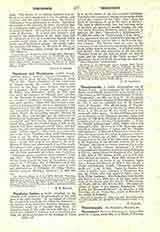

Theodosiopolis, a. titular metropolitan see of Thracia Prima. In the beginning the city was called Apros, or preferably Aproi; later in its history it became known as the Colonia Claudia Aprensis (Ptolemy, “Geographia”, vol. III, cap. xi, p. 7). In the fourth century, according to Ammianus Marcellinus (XXVII, iv, 12), it was the principal city of the country south of Heraclea. The official name of Theodosiopolis, which was given to the city by either Theodosius I, or Theodosius II, was rarely used; it was commonly called Apros. At first suffragan episcopal see of Heraclea in the European province, Apros had already in 640 been elevated to an autocephalous archiepiscopal see (Gelzer, “Ungedruckte…Texte der Notitiae episcopatuum”, 535), which title it still retained in 1170. However in 1179, Romanus signs himself as Metropolitan of Apros, and the “Notitia episcopatuum” of Manuel I Comnenus, which dates from this same epoch, also refers to Apros as a metropolitan see (Gelzer, op. cit., 587). This see must have disappeared at the end of the fourteenth century, or in the beginning of the fifteenth century, for in the “Notitiae” subsequent to 1453 no mention of it is to be found. Le Quien, “Oriens christianus”, I, 1125-1128, makes special mention of eleven bishops belonging to this see among whom are Babylas in 458; Andreas in 536; John in 787; Sabbas in 878; and in 1351, Gabriel, the last one known. From 1204, as long as the city remained in the hands of the Crusaders, Apros was a Roman archdiocese; in 1244 it was already a titular archbishopric (Eubel, “Hierarchia catholica medii nevi”, I, 94; II, 101). Under the Franks, who called it Naples, Apros belonged to Theodosius Branas, the Greek, who had married Agnes, sister of King Philip Augustus. The Bulgarians took the city and destroyed it in 1205; later it fell anew under the sway of the Franks and the Greeks (Villehardouin, ed. Wailly, 390-91, 403, 413-15, 564). The exact situation of Apros is not known; Tomaschek, “Zur Kunde der Hiemus-Halbinsel”, 52, identifies it with Kestridje on the Podja-Dere, south of Haireboli in the sanjak of Rodosto.
S. VAILHE

